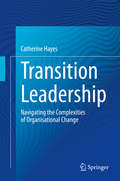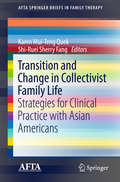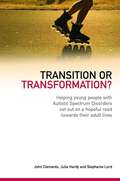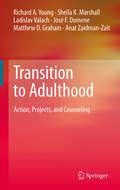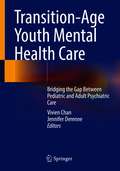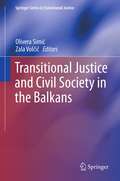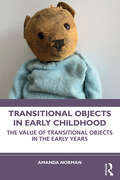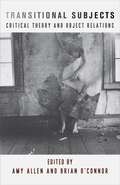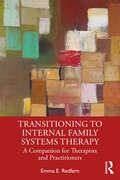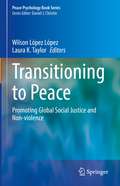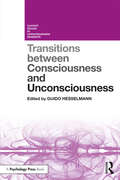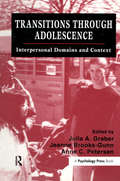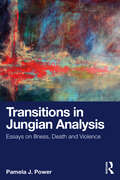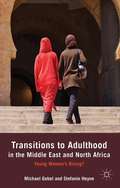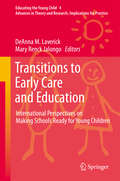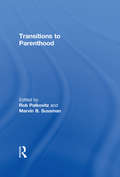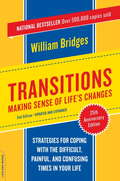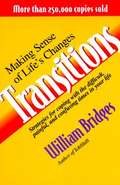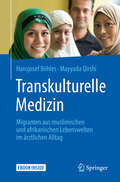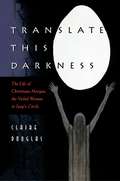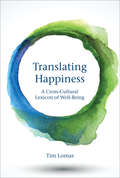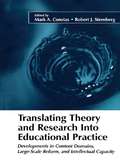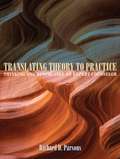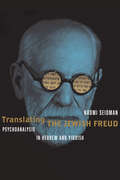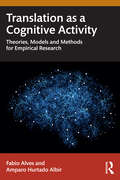- Table View
- List View
Transition Leadership: Navigating the Complexities of Organisational Change
by Catherine HayesIntegrating practitioner research with Buddhist philosophy, business and clinical psychology, this book provides a new perspective on leading change in organisations, supporting leaders and change professionals with insight into useful practices for today’s business environment. It identifies the unseen and overlooked complexities of the transition space, helping leaders to recognize patterns in their own leadership practices. This volume includes approaches for working at the intersection of complexity and ambiguity, and discusses how different mindsets impact behavior and outcomes which may get in the way of change agendas. It focuses on approaches for navigating the challenges of organisational transitions, while developing sustainable transition capabilities and practices A comprehensive new framework for understanding and shaping business management, Transition Leadership is a valuable resource for students and researches of business practices, work psychology, and transition and change, as well as current and future business and organizational leaders.
Transition and Change in Collectivist Family Life: Strategies for Clinical Practice with Asian Americans (AFTA SpringerBriefs in Family Therapy)
by Karen Mui-Teng Quek Shi-Ruei Sherry FangThis research-to-practice volume grounds clinicians in a robust, culturally-informed framework for conducting effective therapy with Asian-American couples, families, and individuals. Family, cultural, social, and spiritual dynamics are explored across ethnicities, generations, relationships, and immigrant/citizen experience to reflect a diverse, growing population. Discussion and case examples focus on contrasts, conflicts, and balances involved in acculturation and change, notably the shift from collectivist cultural tradition to a more independent view of the self, gender, choices, and relationships. The contributors’ finely shaded guidance and accessible approach will help therapists provide appropriate services for Asian-American clients without minimizing or pathologizing their experiences.Included in the coverage:How Asian American couples negotiate relational harmony: collectivism and gender equality.Through religion: working-class Korean immigrant women negotiate patriarchy.The role of Chinese grandparents in their adult children’s parenting practices in the United States.Balancing the old and the new: the case of second generation Filipino American women.Bicultural identity as a protective factor among Southeast Asian American youth who have witnessed domestic violence. Transition and Change in Collectivist Family Life is a cogent clinical resource for practitioners and mental health professionals with interests in Asian-American family therapy, psychotherapy, collectivism, and faith-based community and counseling.
Transition or Transformation?
by John Clements Julia Hardy Stephanie LordYoung people with Autism Spectrum Disorders (ASDs) can often find the step into adulthood and independence more difficult than their neurotypical peers, particularly where employment is concerned. The authors show, however, that with the right guidance and a positive attitude in schools, young people with ASDs can be every bit as happy and successful as those who are not on the spectrum. The book describes a programme developed over a number of years by teachers at a school for young people with ASDs, which successfully enabled autistic pupils to achieve their full potential. The authors explain in detail the challenges faced by the young people at the school, and show how, encouraged by a culture of optimism and hopefulness, the programme developed their confidence and skills, with the result that many of them are now in employment. The book also provides an in-depth exploration of a multitude of styles and techniques for building relationships. Concluding with a reflection on leadership and organisational culture, the authors demonstrate that if the approach is adopted by an entire school and not just a handful of teachers, it really can work. This inspiring and innovative book will be a must for educators at every level, psychologists, academics, and anybody else interested in a positive educational approach that will enable young people with ASDs to get the most out of life.
Transition to Adulthood
by Richard A. Young Anat Zaidman-Zait Ladislav Valach Sheila K. Marshall José F. Domene Matthew D. GrahamThe transition to adulthood involves, for most individuals, moving from school to work, establishment of long-term relationships, possibly parenting, and a number of other psychosocial transformations. Now more than ever, there is a concern within popular and research literature about children growing up too soon or too late or failing to realize changes associated with being adult. With this in mind, the book intends to answer a series of timely questions in regard to transition to adulthood and propose a wholly new approach to counseling that enables youth to engage fully in their lives and achieve their best. Active Transition to Adulthood: A New Approach for Counseling will discuss the authors' work on the transition to adulthood (including early and late adolescence) from an entirely innovative perspective - action theory. Over a period of 10-15 years the authors have collected substantial data on adolescents and youth in transition, and will present an approach to counseling based on these data and cases. The action theory perspective in which the authors have grounded their work addresses the intentional, goal-directed behavior of persons and groups that is expressed through particular actions, longer-term projects, and life-encompassing careers. In this book, both transition to adulthood and counseling will be covered in the language of goal-directed action. In this way both transition and counseling reflect and capture the action, projects, and careers in which families, youth, and clients are engaged and use to construct on-going identity and other narratives.
Transition-Age Youth Mental Health Care: Bridging the Gap Between Pediatric and Adult Psychiatric Care
by Jennifer Derenne Vivien ChanOver the course of the last two decades, improved practices in child and adolescent mental healthcare have led to a decreased environment of stigma, which also led to an increased identification and treatment of mental health disorders in children and youth. Considering that treatment and outcomes are improved with early intervention, this is good news. However, the success gained in the field of child and adolescent psychiatry leads to a new challenge: transitioning from adolescent care to adult care. It has been known for some time that children, adult, and geriatric patients all have unique needs where it comes to mental healthcare, yet limited work has been done where it comes to the shifting of the lifespan. Where it comes to the child-adult transition—defined as those in their late teens and early/mid-20s—there can be multiple barriers in seeking mental healthcare that stem from age-appropriate developmental approaches as well as include systems of care needs. Apart from increasing childhood intervention, the problem is exacerbated by the changing social dynamics: more youths are attending college rather than diving straight into the workforce, but for various reasons these youths can be more dependent on their parents more than previous generations. Technology has improved the daily lives of many, but it has also created a new layer of complications in the mental health world. The quality and amount of access to care between those with a certain level of privilege and those who do not have this privilege is sharp, creating more complicating factors for people in this age range. Such societal change has unfolded so rapidly that training programs have not had an opportunity to catch up, which has created a crisis for care. Efforts to modernize the approach to this unique age group are still young, and so no resource exists for any clinicians at any phase in their career. This book aims to serve as the first concise guide to fill this gap in the literature. The book will be edited by two leading figures in transition age youth, both of whom are at institutions that have been at the forefront of this clinical work and research. This proposed mid-sized guide is therefore intended to be a collaborative effort, written primarily by child and adolescent psychiatrists, and also with adult psychiatrists. The aim is to discuss the developmental presentation of many common mental health diagnoses and topics in chapters, with each chapter containing clinically-relevant “bullet points” and/or salient features that receiving providers, who are generally, adult-trained, should keep in mind when continuing mental health treatment from the child and adolescent system. Chapters will cover a wide range of challenges that are unique to transition-age youths, including their unique developmental needs, anxiety, mood, and personality disorders at the interface of this development, trauma and adjustment disorders, special populations, and a wide range of other topics. Each chapter will begin with a clinical pearl about each topic before delving into the specifics.
Transitional Justice and Civil Society in the Balkans
by Olivera Simić Zala VolčičTransitional Justice and Civil Society in the Balkans covers civil society engagements with transitional justice processes in the Balkans. The Balkans are a region marked by the post-communist and post-conflict transitional turmoil through which its countries are going through. This volume is intended to provide a comprehensive introduction to research in transitional justice in this part of the world, mostly written by local scholars. Transitional justice is ever-growing field which responds to dilemmas over how successor regimes should deal with past human rights abuses of their authoritarian predecessors. The editors and author emphasize the relatively unexplored and under-researched role of civil society groups and social movements, such as local women's groups, the role of art and community media and other grass-roots transitional justice mechanisms and initiatives. Through specific case-studies, the unique contribution of this volume is not only that it covers a part of the world that is not adequately represented in transitional justice field, but also that the volume is the first project originally researched and written by experts and scholars from the region or in collaboration with international scholars.
Transitional Objects in Early Childhood: The Value of Transitional Objects in the Early Years
by Amanda NormanIn this innovative book, Amanda Norman looks at D. W. Winnicott’s theory of Transitional Objects in early years practice, the ‘good-enough’ parent, and the relationship between the young child and primary carer in relation to the value of Transitional Objects.Norman looks at how an understanding of psychological theories can be useful when caring for young children in both educational and research contexts, aiding those interested in understanding therapeutic relationships, and applying the principles to promote the use of Transitional Objects in their work. Throughout the book, Norman uses case studies from parents, children, and practitioner’s perspectives in supporting physical and emotional development. Through these, she shows how observing Transitional Objects is particularly relevant to living in the west, where a low touch, high technology culture prevails, compounded by the recent pandemic. This volume contributes to a timely connection between the understanding and application of therapeutic approaches within early educational contexts. Including engaging exercises at the end of each chapter, this book is a perfect companion for those approaching the concept of Transitional Objects for the first time.Transitional Objects in Early Childhood is vital reading for those with an interest in the psychology of the infant/young child and their relationship and realities with the external world. It will be of particular interest to those specialising in infant and child care who wish to develop their knowledge of emotional development through play, as well as those working in a variety of social, education, and health contexts.
Transitional Subjects: Critical Theory and Object Relations (New Directions in Critical Theory #67)
by Amy Allen Axel Honneth C. Fred Alford James Martel Owen Hulatt Joel Whitebook Johanna Meehan Noëlle McAfee Alessandro Ferrera Sara BeardsworthCritical social theory has long been marked by a deep, creative, and productive relationship with psychoanalysis. Whereas Freud and Fromm were important cornerstones for the early Frankfurt School, recent thinkers have drawn on the object-relations school of psychoanalysis. Transitional Subjects is the first book-length collection devoted to the engagement of critical theory with the work of Melanie Klein, Donald Winnicott, and other members of this school. Featuring contributions from some of the leading figures working in both of these fields, including Axel Honneth, Joel Whitebook, Noëlle McAfee, Sara Beardsworth, and C. Fred Alford, it provides a synoptic overview of current research at the intersection of these two theoretical traditions while also opening up space for further innovations.Transitional Subjects offers a range of perspectives on the critical potential of object-relations psychoanalysis, including feminist and Marxist views, to offer valuable insight into such fraught social issues as aggression, narcissism, “progress,” and torture. The productive dialogue that emerges augments our understanding of the self as intersubjectively and socially constituted and of contemporary “social pathologies.” Transitional Subjects shows how critical theory and object-relations psychoanalysis, considered together, have not only enriched critical theory but also invigorated psychoanalysis.
Transitioning to Internal Family Systems Therapy: A Companion for Therapists and Practitioners
by Emma E. RedfernTransitioning to Internal Family Systems Therapy is a guide to resolving the common areas of confusion and stuckness that professionals often experience when facilitating the transformational potential of the IFS model. Real-life clinical and autobiographical material is used throughout from the author’s supervision practice, together with insights from IFS developer Richard C. Schwartz and other lead trainers and professionals. With the use of reflective and practical exercises, therapists and practitioners (those without a foundational therapy training) are encouraged to get to know and attend to their own inner family of parts, especially those who may be struggling to embrace the new modality. Reflective statements by professionals on their own journeys of transition feature as a unique element of the book. Endnotes provide the reader with additional information and direct them to key sources of information on IFS.
Transitioning to Peace: Promoting Global Social Justice and Non-violence (Peace Psychology Book Series)
by Laura K. Taylor Wilson López LópezThis edited volume highlights how individuals, communities and nations are addressing a history of protracted violence in the transition to peace. This path is not linear or straightforward. The volume integrates research from peace processes and practices spanning over 20 countries. Four thematic areas unite these contributions: formal transitional justice mechanisms, social movements and collective action, community-driven processes, and future-oriented initiatives focused on children and youth. Across these chapters, the volume offers critical insight, new methods, conceptual models, and valuable cross-cultural research. The chapters in this volume balance locally-situated realties of peace, as well as cross-cutting similarities across contexts. This book will be of particular interest to those working for peace on the frontlines, as well as global policymakers aiming to learn from other cases. Academics in the fields of psychology, sociology, education, peace studies, communication, community development, youth studies, and behavioral economics may be particularly interested in this volume.
Transitions Between Consciousness and Unconsciousness (Current Issues in Consciousness Research)
by Guido HesselmannThe empirical study of consciousness is in constant progress. New ideas and approaches arise, methods are being debated and refined, and experimental research over the last two decades has produced a rich body of data, acquired in the aim to better understand consciousness and its neural underpinnings. This volume synthesises this data, focusing on how to understand the relations and transitions between consciousness and unconsciousness alongside exploring and distinguishing conscious experience of sensory stimuli and unconscious states. Bringing together leading academics and promising young scientists from across the fields of psychology and neuroscience, Transitions between Consciousness and Unconsciousness discusses controversial topics and ideas, providing an overview of current research trends and opinions, as well as perspectives on theoretical and methodological questions. This is an essential volume for consciousness researchers and students from across psychology, neuroscience and philosophy, as well as those researching modes of visual processing.
Transitions Through Adolescence: Interpersonal Domains and Context
by Anne C. Petersen Jeanne Brooks-Gunn Julia A. GraberThe adolescent period has attracted much attention as an ideal period for investigating interactive models incorporating biological maturation with intra- and interpersonal development. The focus of this volume is on adolescent transitions in three domains: the peer system, the family system, and school and work contexts. Its goal is to highlight specific aspects of innovative research programs and initiatives, and look forward to future directions in the field. Because interest in adolescence has spanned the disciplines, this volume reflects a multidisciplinary perspective--presenting research and methods from life-span development, sociology, anthropology, and education to provide exemplars of the range of approaches used in understanding the processes and transitions of adolescent development. These exemplars encompass the breadth not only of the investigation of adolescence--from survey research on drug use to ethnographic studies of involvement in criminal activities--but also of individual differences in the experience of adolescent transitions--from the transition to college and work in White, middle-class youth to the work experiences of urban, African-American high school students. The chapters collected here offer a rich sample of the diversity of research experience with an emphasis on in-depth investigation of adolescent transitions. The volume will serve as a resource to investigators across several disciplines as it identifies approaches and recent findings from alternate fields.
Transitions in Jungian Analysis: Essays on Illness, Death and Violence
by Pamela J. PowerThis deeply personal book contains essays and articles that portray the evolution of the author as a practicing Jungian analyst. Themes of illness, death, and violence are inherent within the chapters of this book. She uses metaphors from music to describe transitions, some involve literal death, and others are metaphorical. The chapters of this book provide an engaging and readable review of life from one Jungian psychoanalyst, featuring essays on topics such as physical illness, film, music, video games, and her dog. The author covers problematic psychological and physical conditions, each of which, through exploration and inquiry, provides a transition to a new depth of understanding and a renewed sense of self. The book begins with the death of Power’s Jungian analyst and the subsequent experiences when she began a "new analysis." She describes a "mysterious illness" that took her from being a classical musician to becoming a Jungian analyst. Other chapters include one on the nature of violence, another on the clinical issue of the "negative coniunctio" in the consulting room, and another on body symptoms and illness as "vanishing mediators" that take her from one status to another. A personal and engaging read, this new collection by an experienced analyst will be of interest to Jungian analysts, clinicians in both analytical psychology and psychoanalysis, and those undertaking psychoanalytic training.
Transitions to Adulthood in the Middle East and North Africa
by Michael Gebel Stefanie HeyneThis book identifies chances and barriers women face in their transition to adulthood in Egypt, Iran, Jordan, and Syria. Adopting a life course perspective, it provides a new integrative micro-macro-theoretical framework and innovative analyses of individual life courses based on longitudinal data.
Transitions to Early Care and Education
by Mary Renck Jalongo Deanna M. LaverickTransitions to new educational experiences are a universal rite of passage encountered by children worldwide. This volume in the Educating the Young Child: Advances in Theory and Research, Implications for Practice series provides early childhood educators with a resource that focuses on the transitions that young children make to early care and education settings, along with the issues that surround this important time in their lives. New experiences, such as the start of formal schooling, mark important and exciting events that also evoke different reactions from children and their families. The diverse experiences, traits, and needs exhibited by young children provide early childhood educators with what may be a potentially challenging role. With an international focus, the purpose of Transitions to Early Care and Education: International Perspectives on Making Schools Ready for Young Children is to communicate an enlarged view of the transition process in order to appreciate and honor the promise and potential of all children worldwide. Contributing to this volume are a group of distinguished researchers, practitioners, and educators in the field of early childhood education. Their collective expertise is shared with those who are committed to educating and caring for young children and the families they serve.
Transitions to Parenthood
by Marvin B Sussman Robin J PalkovitzIn this unusual but exciting look at a complex topic, family scholars offer a vast array of insights into the multiple consequences, concerns, and characteristics of parenthood. The transition to parenthood--the most critical step in individual and family life cycles--is thoroughly examined from a social psychological perspective. Cultural and ethnic factors are considered as major influences in the transition to parenthood, as are changing patterns in the work force, the consequences of the gender revolution, and altered patterns of marriage and divorce--all of which have shattered the traditional ways of parenting. Family theorists, practitioners, and parents are strongly encouraged to further research and discuss the necessary elements and available options involved in facing the changes brought on by parenthood.
Transitions: Making Sense Of Life's Changes
by William BridgesWhether it is chosen or thrust upon you, change brings both opportunities and turmoil. Since first published 25 years ago, Transitions has helped hundreds of thousands of readers cope with these issues by providing an elegantly simple yet profoundly insightful roadmap of the transition process. With the understanding born of both personal and professional experience, William Bridges takes readers step by step through the three stages of any transition: The Ending, The Neutral Zone, and, in time, The New Beginning. Bridges explains how each stage can be understood and embraced, leading to meaningful and productive movement into a hopeful future. With a new introduction highlighting how the advice in the book continues to apply and is perhaps even more relevant today, and a new chapter devoted to change in the workplace, Transitions will remain the essential guide for coping with the one constant in life: change.
Transitions: Making Sense of Life's Changes
by William BridgesStrategies for coping with the difficult, painful, and confusing times in your life.
Transkulturelle Medizin
by Hansjosef Böhles Mayyada QirshiDas Buch behandelt die wesentlichen kulturellen Eigenheiten von Patienten aus dem arabisch-islamischen und afrikanischen Kulturkreis, Erkrankungen und Einstellungen dazu mit dem Akzent auf Geflüchteten, Asylsuchenden und Migranten, einschließlich Kindern.Die Autoren klären über Missverständnisse auf, beseitigen Unsicherheiten und zeigen die Auswirkungen der kulturellen Diversität auf den Umgang mit Ärzten und Gesundheitsfachberufen im hiesigen Gesundheitssystem. Geprägt von jahrelanger Erfahrung mit Flüchtlingen aus unterschiedlichen Lebenswelten, schärfen die Autoren Ihr Wissen und Bewusstsein für die Kulturunterschiede und bahnen mit hilfreichen Anregungen einen Weg zu einem erfolgreichen, empathischen Arzt-Patientenverhältnis.
Translate this Darkness: The Life of Christiana Morgan, the Veiled Woman in Jung's Circle
by Claire DouglasChristiana Morgan was an erotic muse who influenced twentieth-century psychology and inspired its male creators, including C. G. Jung, who saw in her the quintessential "anima woman." Here Claire Douglas offers the first biography of this remarkable woman, exploring how Morgan yearned to express her genius yet sublimated it to spark not only Jung but also her own lover Henry A. Murray, a psychologist who with her help invented the thematic apperception test (TAT). Douglas recounts Morgan's own contributions to the study of emotions and feelings at the Harvard Psychological Clinic and vividly describes the analyst's turbulent life: her girlhood in a prominent Boston family; her difficult marriage; her intellectual awakening in postwar New York; her impassioned analysis with Jung, including her "visions" of a woman's heroic quest, many of which furthered his work on archetypes; her love affairs and experiences with sexual experimentation; her alcoholism; and, finally, her tragic death.
Translating Happiness: A Cross-Cultural Lexicon of Well-Being (The\mit Press Ser.)
by Tim LomasHow embracing untranslatable terms for well-being—from the Finnish sisu to the Yiddish mensch—can enrich our emotional understanding and experience.Western psychology is rooted in the philosophies and epistemologies of Western culture. But what of concepts and insights from outside this frame of reference? Certain terms not easily translatable into English—for example, nirvāṇa (from Sanskrit), or agápē (from Classical Greek), or turangawaewae (from Māori)—are rich with meaning but largely unavailable to English-speaking students and seekers of wellbeing. In this book, Tim Lomas argues that engaging with “untranslatable” terms related to well-being can enrich not only our understanding but also our experience. We can use these words, Lomas suggests, to understand and express feelings and experiences that were previously inexpressible.Lomas examines 400 words from 80 languages, arranges them thematically, and develops a theoretical framework that highlights the varied dimensions of well-being and traces the connections between them. He identifies three basic dimensions of well-being—feelings, relationships, and personal development—and then explores each in turn through untranslatable words. Ânanda, for example, usually translated as bliss, can have spiritual associations in Buddhist and Hindu contexts; kefi in Greek expresses an intense emotional state—often made more intense by alcohol. The Japanese concept of koi no yokan means a premonition or presentiment of love, capturing the elusive and vertiginous feeling of being about to fall for someone, imbued with melancholy and uncertainty; the Yiddish term mensch has been borrowed from its Judaic and religious connotations to describe an all-around good human being; and Finnish offers sisu—inner determination in the face of adversity.Expanding the lexicon of well-being in this way showcases the richness of cultural diversity while reminding us powerfully of our common humanity. Lomas's website, www.drtimlomas.com/lexicography, allows interested readers to contribute their own words and interpretations.
Translating Theory and Research Into Educational Practice: Developments in Content Domains, Large Scale Reform, and Intellectual Capacity (Educational Psychology Series)
by Mark A. Constas and Robert J. SternbergThis book shows, in detail and with concrete examples, how educational theory and research can be translated into practice. Well-known researchers who have worked to establish productive, sustainable connections between the knowledge produced by the research community and the practices employed in school settings provide descriptions of successful strategies that have been used to bridge the gap among theory, research, and practice. The volume addresses three main themes: *analysis of how educational theory and research may be used to improve student learning and achievement in mathematics, science, and reading; *examination of how educational theory and research has been used to conceptualize, implement, and evaluate the effects of challenges of large-scale reform; and *exploration of how different models of intelligence and creativity have informed educational practice. Viewed as a collective effort to translate theory and research into educational practice, the interventions and programs described by the contributors to this volume represent nearly 200 years of work. As a compendium of successful strategies, this book will help others identify ways to make their own research more useful to their practice communities. As an investigation of persistent, seemingly intractable problems encountered when attempting to connect theory and research to the everyday work of teachers and students in classrooms, the analyses presented in this volume demonstrate where additional work is needed. By examining critical, persistent challenges encountered when attempting to connect educational theory and research to the everyday work of teachers in classrooms and schools, this book will help improve the practical value of educational research and help chart the course for future research.Translating Theory and Research into Educational Practice is intended as a text for advanced undergraduate and graduate courses across the discipline of education and should be particularly relevant for classes dealing with educational research, educational policy, and teaching and learning. The book is equally relevant for various communities interested in improving connections between research and practice, including educational researchers, educational psychologists, psychologists, teachers, other educational professionals such as state school officers, district officials, and policy makers. The authors' comprehensive descriptions and critical reflections will provide readers with valuable insights about the practical demands, theoretical complexities, and political realties associated with efforts to translate theory and research into effective educational practice.
Translating Theory to Practice: Thinking and Acting Like an Expert Counselor
by Richard D. ParsonsLet me tell you about my home heating system. I know, this is probably not what you expected when you began reading--but stay with me! Anyway, I have a relatively new gas heater for my house. One evening this past winter, the house got very chilly and it was clear the heater wasn't working.
Translating the Jewish Freud: Psychoanalysis in Hebrew and Yiddish (Stanford Studies in Jewish History and Culture)
by Naomi SeidmanThere is an academic cottage industry on the "Jewish Freud," aiming to detect Jewish influences on Freud, his own feelings about being Jewish, and suppressed traces of Jewishness in his thought. This book takes a different approach, turning its gaze not on Freud but rather on those who seek out his concealed Jewishness. What is it that propels the scholarly aim to show Freud in a Jewish light? Naomi Seidman explores attempts to "touch" Freud (and other famous Jews) through Jewish languages, seeking out his Hebrew name or evidence that he knew some Yiddish. Tracing a history of this drive to bring Freud into Jewish range, Seidman also charts Freud's responses to (and jokes about) this desire. More specifically, she reads the reception and translation of Freud in Hebrew and Yiddish as instances of the desire to touch, feel, "rescue," and connect with the famous Professor from Vienna.
Translation as a Cognitive Activity: Theories, Models and Methods for Empirical Research
by Fabio Alves Amparo Hurtado AlbirTranslation as a Cognitive Activity provides an overarching account of translation as a cognitive activity, from the pioneering use of think-aloud protocols as a sole technique used to investigate the translation process in the mid-1980s to the latest developments in the field. This book focuses on the main aspects of translation as a cognitive activity, including detailed descriptions of translation process research as well as research on translation competence and its acquisition. Providing thorough information into ways of studying translation as a cognitive activity by means of systematic references to empirical-experimental investigations, this innovative textbook promotes knowledge about the cognitive study of translation to related fields.With detailed explanations about models related to the functioning of the translation process and translation competence as well as an updated account of methods and instruments used in empirical-experimental research in translation, this is the ideal resource for students and translator trainers as well as novice and experienced translators.
